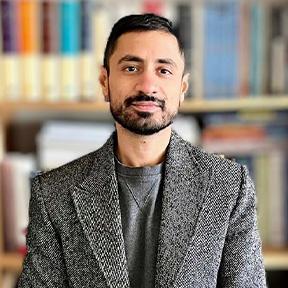I am a historian of the early modern and modern Middle East, Iran, and the neighboring regions where the Persian language and culture exerted political and literary influence.
My book monograph in progress examines the intertwined histories of literacy and religion in modern Iran. I show that as Iranians entered the twentieth century, the main purpose of literacy was no longer flourishment in a spiritually-integrated world. In the new order, children and adults read and wrote to live as functional members of the nation-state. Paradoxically, this secular-seeming transformation in education occurred without secular educational ideas or practices. However, as literacy became tied to state formation, a secularizing impact on social life followed. The political and epistemic features of new education made it possible for Iranians to become non-religious as a form of identity. In other words, secularization of knowledge and identity occurred but without the secular. In modern Iran, the publicness of political Islam and the secularization of social and literate culture occurred in tandem, generating divisions over the role of religion in society into the present day.
Entitled “Mass Literacy, Education, and Secularization in Modern Iran,” the monograph revises the concept of secularization for an Iranian historical context. I engage with a stream of postcolonial thought, which follows the cognitive problem of orientalism (instead of the representational problem). The cognitive problem interrogates existing concepts and theories, entangled with European intellectual traditions and histories, in reference to Middle Eastern sources. Following the cognitive route, I revise secularization with facts from Persian sources. My research contributes to ongoing debates in postcolonialism by opening up the conceptualization of religion under the conditions of modernity to a wider range of human histories beyond Europe and the West.
My research draws heavily on new Persian-language archives. They include the collections at the National Library and Archives of Iran, the University of Tehran Manuscript and Documents Archives, Tehran’s rare book merchants, and the Roshdieh family archives. I use a combination of printed, manuscript, and documentary sources in Persian and Arabic. Beyond the subject of modern education, my archivally-driven publications examine the themes of industrialization, cultural imperialism, and intellectual history. I have also contributed to public history projects at Stanford University, Columbia University, and the Metropolitan Museum of Art. Working with other scholars and archivists, I described, translated, and digitized Persian manuscripts and documents for increased public access.
I received my Ph.D. in 2022 from the Department of Middle Eastern, South Asian, and African Studies of Columbia University, where I also received the 2021 Ehsan Yarshater Named Fellowship for my contributions to the field of Iranian and Persian Studies.
EXPERTISE AREAS
Iranian and Persian histories, Middle East history, Islamic history, colonialism, intellectual history, postcolonial and social theory, primary sources, Persian documents and manuscripts, public history.
PEER-REVIEWED PUBLICATIONS
BOOK
“Mass Literacy, Education, and Secularisation in Modern Iran,” Edinburgh University Press, Historical Studies of Iran and the Persian World Series (monograph under contract, revisions due Dec. 2025).
ARTICLES
- “The Persian Carpet in Crisis: The Emergence of Modern Dyeing Education in Qajar Iran (1882-1922).” The Journal of Modern Craft, Taylor & Francis (with Sajjad Norouzi and Hassan Zandieh), 17:3, 207-220 (December 2024)
- “From The Creators of Knowledge to the Specialists of Spirit: Anti-Clericalism in Iran’s Modernist Intellectual Discourse (1925-1941),” Harvard Theological Review, Cambridge University Press, 117:4, 820-36 (October 2024).
- "Reflections on Cultural Imperialism: Iran’s Discourse of Misery (badbaxti)". Journal of World Sociopolitical Studies, The University of Tehran Press, 7:4, 713-740 (July 2023).
- “The Origins of Dabestān: Mīrzā Ḥasan Rushdīyeh and the Quest for New Education,” Iranian Studies,
Cambridge University Press, 53:1, 1-33 (May 2020).
WORKS IN PROGRESS
- Revise & Resubmit “Iran’s Intellectual Modernism Revisited: Muhammad Taqi Bahar’s Philia for South Asia,” Middle East Critique, Iran and the World Special Issue, Taylor & Francis (2025).
- Draft in progress “Colonial Authority versus Persian Prestige: Towards a Connected Persianate History of Iran, Afghanistan, and India in the Nineteenth Century.”
PUBLIC HISTORY PROJECTS
- Ardeshir Zahedi Papers, 1923-2019, Stanford University (archival fellow).
- Science, Nature and Beauty: Harmony and Cosmological Perspectives in Islamic Science, Koukab Chebaro, ed. (New York: Columbia University Press, 2022) (curatorial contributor).
- “An Iran Travelogue: French Journeywoman and Her Persian Scribe,” 78-folio, illustrated Persian manuscript dated 1835, The Metropolitan Museum of Art in New York (exhibition, 2022) (Persian to English translator).
Teaching Experience
Upcoming LUMS Courses
- Spring 2026
“Knowledge and Literacy in the Persian World.” 400-level. - Spring 2026
“The Formation of the Modern Middle East.” 200-level. - Instructor of Record, LUMS
Fall 2025
“Empire and its Critics: A Global Perspective.” 200-level. - Spring 2025
“The Formation of the Modern Middle East.” 200-level.
Instructor of Record, University of Tehran - Fall 2024 “Philosophy of History.” M.A. course.
- Spring 2024 “The History of Colonialism and Capitalism.” 200-level.
- Teaching Assistant Fellow, Columbia University 2016-2022

